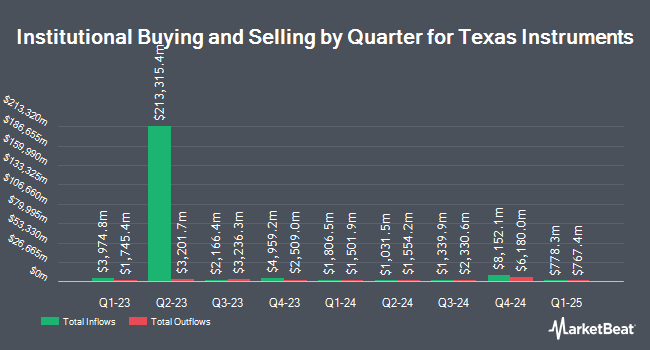Rhumbline Advisers cut its holdings in shares of Texas Instruments Incorporated (NASDAQ:TXN - Free Report) by 1.9% in the 1st quarter, according to the company in its most recent disclosure with the Securities and Exchange Commission (SEC). The institutional investor owned 1,756,625 shares of the semiconductor company's stock after selling 34,520 shares during the period. Rhumbline Advisers owned approximately 0.19% of Texas Instruments worth $315,665,000 at the end of the most recent reporting period.
Other hedge funds and other institutional investors have also recently added to or reduced their stakes in the company. China Universal Asset Management Co. Ltd. lifted its holdings in shares of Texas Instruments by 30.4% in the fourth quarter. China Universal Asset Management Co. Ltd. now owns 19,367 shares of the semiconductor company's stock worth $3,632,000 after buying an additional 4,515 shares in the last quarter. Mizuho Securities USA LLC lifted its position in Texas Instruments by 46.0% during the fourth quarter. Mizuho Securities USA LLC now owns 86,457 shares of the semiconductor company's stock valued at $16,212,000 after purchasing an additional 27,251 shares during the last quarter. OFC Financial Planning LLC purchased a new position in shares of Texas Instruments during the fourth quarter worth approximately $338,000. Union Bancaire Privee UBP SA bought a new stake in Texas Instruments in the fourth quarter worth $6,544,000. Finally, Banque Pictet & Cie SA grew its holdings in shares of Texas Instruments by 0.9% in the fourth quarter. Banque Pictet & Cie SA now owns 2,197,676 shares of the semiconductor company's stock worth $412,086,000 after purchasing an additional 18,650 shares during the last quarter. 84.99% of the stock is owned by institutional investors.
Analyst Upgrades and Downgrades
Several equities analysts have recently issued reports on TXN shares. Benchmark reduced their target price on Texas Instruments from $230.00 to $200.00 and set a "buy" rating on the stock in a research note on Thursday, April 24th. KeyCorp dropped their price target on Texas Instruments from $250.00 to $215.00 and set an "overweight" rating on the stock in a research report on Thursday, April 24th. UBS Group lowered their price objective on Texas Instruments from $225.00 to $215.00 and set a "buy" rating for the company in a research report on Thursday, April 24th. Wells Fargo & Company reduced their target price on shares of Texas Instruments from $200.00 to $175.00 and set an "equal weight" rating on the stock in a research report on Thursday, April 24th. Finally, JPMorgan Chase & Co. decreased their price target on shares of Texas Instruments from $230.00 to $195.00 and set an "overweight" rating for the company in a research note on Thursday, April 24th. Four analysts have rated the stock with a sell rating, eleven have issued a hold rating, nine have issued a buy rating and two have given a strong buy rating to the company's stock. According to MarketBeat, the stock has a consensus rating of "Hold" and a consensus price target of $189.41.
Get Our Latest Research Report on Texas Instruments
Texas Instruments Trading Up 1.3%
NASDAQ:TXN traded up $2.54 during midday trading on Thursday, hitting $193.26. The stock had a trading volume of 2,006,434 shares, compared to its average volume of 7,580,250. Texas Instruments Incorporated has a one year low of $139.95 and a one year high of $220.38. The company has a market capitalization of $175.57 billion, a price-to-earnings ratio of 37.24, a PEG ratio of 3.30 and a beta of 0.97. The stock has a 50-day moving average of $168.37 and a 200 day moving average of $182.34. The company has a quick ratio of 2.88, a current ratio of 4.12 and a debt-to-equity ratio of 0.76.
Texas Instruments (NASDAQ:TXN - Get Free Report) last released its quarterly earnings data on Wednesday, April 23rd. The semiconductor company reported $1.28 earnings per share for the quarter, beating the consensus estimate of $1.06 by $0.22. Texas Instruments had a return on equity of 28.08% and a net margin of 30.68%. The firm had revenue of $4.07 billion during the quarter, compared to the consensus estimate of $3.91 billion. During the same period in the previous year, the company posted $1.10 earnings per share. The firm's quarterly revenue was up 11.1% on a year-over-year basis. As a group, sell-side analysts forecast that Texas Instruments Incorporated will post 5.35 EPS for the current year.
Texas Instruments Dividend Announcement
The firm also recently disclosed a quarterly dividend, which was paid on Tuesday, May 13th. Investors of record on Wednesday, April 30th were issued a dividend of $1.36 per share. This represents a $5.44 annualized dividend and a yield of 2.81%. The ex-dividend date of this dividend was Wednesday, April 30th. Texas Instruments's payout ratio is 103.23%.
Texas Instruments Company Profile
(
Free Report)
Texas Instruments Incorporated designs, manufactures, and sells semiconductors to electronics designers and manufacturers in the United States and internationally. The company operates through Analog and Embedded Processing segments. The Analog segment offers power products to manage power requirements across various voltage levels, including battery-management solutions, DC/DC switching regulators, AC/DC and isolated controllers and converters, power switches, linear regulators, voltage references, and lighting products.
Featured Stories

Before you consider Texas Instruments, you'll want to hear this.
MarketBeat keeps track of Wall Street's top-rated and best performing research analysts and the stocks they recommend to their clients on a daily basis. MarketBeat has identified the five stocks that top analysts are quietly whispering to their clients to buy now before the broader market catches on... and Texas Instruments wasn't on the list.
While Texas Instruments currently has a Hold rating among analysts, top-rated analysts believe these five stocks are better buys.
View The Five Stocks Here
Wondering where to start (or end) with AI stocks? These 10 simple stocks can help investors build long-term wealth as artificial intelligence continues to grow into the future.
Get This Free Report
Like this article? Share it with a colleague.
Link copied to clipboard.
